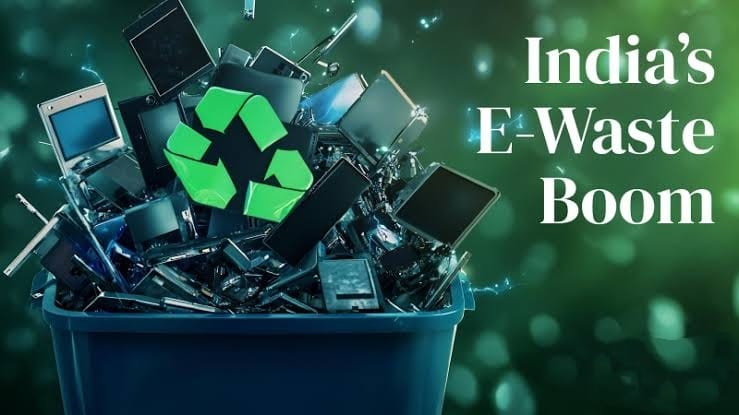 Image Source: SME Futures
Image Source: SME Futures
India is grappling with a dual-edged challenge in managing its soaring electronic waste (e-waste): the lucrative potential of precious metal recovery versus the severe environmental and health hazards caused by toxic pollution. As the country becomes the world’s third-largest e-waste generator, pressing concerns about informal recycling, policy resistance, and pollution risks demand urgent public attention and regulatory action.
Key Highlights:
-
India’s e-waste generation leapt by over 151% in six years, reaching approximately 1.78 million metric tonnes annually in 2023–24.
-
Informal sector currently dominates 95% of e-waste processing through hazardous methods, causing significant pollution and health issues.
-
Valuable metals like gold, copper, and rare earth elements embedded in e-waste represent a massive missed economic opportunity due to inefficient recycling.
-
India suffers environmental damage causing an estimated $10 billion annual loss and social costs exceeding $20 billion from toxic informal practices.
-
Resistance from multinational corporations against mandatory recycling pricing frameworks threatens formal waste processing growth.
-
Government initiatives include implementing Extended Producer Responsibility (EPR) rules and creating India’s first e-waste eco park in Delhi to boost formal recycling and green jobs.
The Growing E-Waste Challenge
India’s rapid digital expansion has transformed it into one of the top global e-waste producers, only behind China and the USA. The volume of discarded electronic products skyrocketed in recent years, partly accelerated by increased remote work and digital consumption post-COVID-19. However, most of this waste—over 90%—is recycled informally, often in unsafe conditions exposing workers to deadly toxins such as lead, mercury, cadmium, and other heavy metals.
Environmental and Health Hazards
Improper e-waste handling leads to severe pollution of water, air, and soil, accumulating toxic substances harmful to humans and ecosystems. The informal recycling sector’s crude methods release carcinogens and neurotoxins that cause respiratory diseases, neurological damage, and dramatically shortened life expectancy, especially among vulnerable women and children involved in this work.
Economic Costs and Lost Potential
India’s inadequate recycling infrastructure results in enormous economic losses. The country forfeits approximately ₹80,000 crore annually in unrecovered precious metals like gold, copper, and rare earths. Moreover, around $20 billion in potential tax revenue is lost due to the predominance of unregulated informal processing. While precious metals embedded in e-waste offer a lucrative opportunity, formal recycling investments remain low because recovered metal sales barely cover operational costs.
Policy and Industry Dynamics
To counter these issues, the government has rolled out Extended Producer Responsibility (EPR) rules mandating producers and importers to ensure sustainable waste disposal. These policies aim to shift recycling accountability to manufacturers, encouraging eco-friendly product design and supporting certified recyclers. Yet, major multinational companies such as Daikin, Hitachi, and Samsung have recently challenged government-mandated minimum pricing for recyclers, pushing back against compliance costs and threatening momentum toward a sustainable e-waste ecosystem.
Promising Interventions and Future Outlook
Recognizing the magnitude of this crisis, new initiatives like India’s first e-waste eco park in Delhi’s Holambi Kalan have been announced. Spanning 11.4 acres and designed to process over 51,000 tonnes of e-waste annually, this eco park combines advanced green technologies with skilling programs to formalize and support informal workers. The facility anticipates generating significant revenue and creating over a thousand green jobs, symbolizing a shift toward a circular economy where no resource is wasted.
In parallel, technology-driven models integrating AI, IoT, and blockchain—coined Supply Chain 4.0—are being explored to improve traceability, enforce producer responsibility, and enhance formal recycling processes, thereby reducing India’s toxic footprint.
Source: The Hindu, Newslaundry, Drishti IAS, Vision IAS, Economic Times
Advertisement
Advertisement



